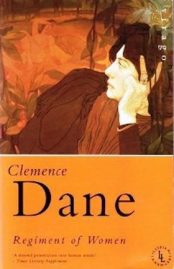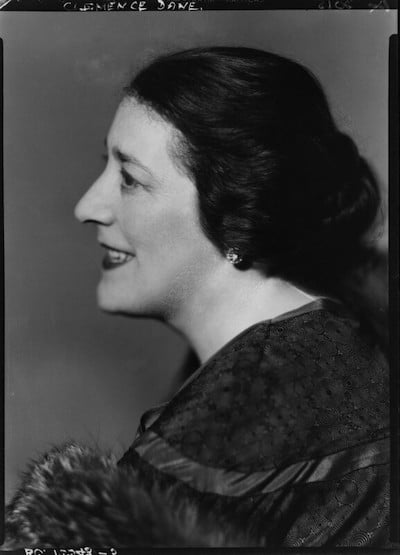Regiment of Women by Clemence Dane (1917)
By Francis Booth | On February 24, 2021 | Updated August 13, 2023 | Comments (0)

This introduction to Regiment of Women (1917), a proto-lesbian novel by the pseudonymous Clemence Dane, is is excerpted from Girls in Bloom: Coming of Age in mid-20th Century Women’s Fiction by Francis Booth, reprinted with permission:
The Well of Loneliness by Radclyffe Hall (1928 ), usually said to be the first English-language novel containing veiled lesbianism was just beaten to the title by Rosamond Lehmann’s Dusty Answer (1927).
But ten years before even that was Regiment of Women, 1917, the debut novel of Clemence Dane, the pseudonym of Winifred Ashton (1888-1965), London-born novelist, playwright, and early feminist.
Clemence Dane’s 1921 play, A Bill of Divorcement, was made into a film three times and Dane went on to write screenplays herself, including Anna Karenina, starring Greta Garbo.
. . . . . . . . .

Winifred Ashton (AKA Clemence Dane)
. . . . . . . . . . .
A leading feminist
As she was thirty years old in 1918, Ashton was one of the first women to be allowed to vote under the new Representation of the People Act – it was not until ten years later that women aged twenty-one and over were allowed to vote.
Ashton joined the Six Point Group, founded in 1921 to press for equality for women in six areas: political, occupational, moral, social, economic, and legal. In 1927, writing as Clemence Dane, she published The Women’s Side.
When conditions are evil it is not your duty to submit . . . when conditions are evil, your duty, in spite of protests, in spite of sentiment, your duty, though you trample on the bodies of your nearest and dearest to do it, though you bleed your own heart while your duty is to see that those conditions are changed.
If your laws forbid you, you must change your laws. If your church forbids you, you must change your church. And if your God forbids you, you must change your God.
. . . . . . . . . .

Girls in Bloom by Francis Booth on Amazon US*
Girls in Bloom on Amazon UK*
Girls in Bloom in full on Issuu
. . . . . . . .
Interpreting and misinterpreting the title
The word ‘Regiment’ in the title Regiment of Women means ‘rule by,’ and is a reference to John Knox’s pamphlet The First Blast of the Trumpet against the Monstrous Regiment of Women, 1558, published at the time of Queen Elizabeth I; Knox argued that rule by women was against the teachings of the Bible.
Dane’s title is obviously ironic but at least two of the book cover designers completely misunderstood the title, or more likely had not read the book: one has a picture of a woman in uniform, depicting a female member of a military regiment, and the other has a picture of a boys’ school.
Clare, Alwynne, and Louise
The two ostensible main characters of the novel are teachers at a private girls’ boarding school: Clare Hartill, in her thirties, deputy headmistress but in practice the person who runs the school, and nineteen-year-old Alwynne Durand. The two women are very close and go abroad together in the summer holidays, implying though never explicitly stating a lesbian relationship.
However, for our purposes, the most interesting character is their fourteen-year-old pupil Louise Denny, who adores Clare more even than the average boarding school girl loves a teacher, though both teachers dote on her in return. There is no explicit suggestion that their interest in Louise is sexual, though the symbolism of calyx and blossom is certainly suggestive.
Clare could be exquisitely tender, could keep all-patient vigil over an unfolding mind, provided that the calyx concealed a rare enough blossom. Louise was encouraged, her shyness swept aside, her ideas developed, her knowledge tested; she was fed, too, cautiously, on richer and richer food – stray evening lectures, picture galleries with Alwynne, headiest of cicerones; the freedom of the library and long talks with Clare.
At home, Louise had no elder sister and unsympathetic parents. When she was sent to boarding school at the age of twelve, ‘She was unaccustomed to companions of her own age and sex and, quite simply, did not know how to make friends.’ Clare’s effect on Louise is shattering; she becomes something between a goddess, a mother, and a sister.
With Clare’s intervention, the world was changed for Louise; she had her first taste of active pleasure. It is difficult to realize what an effect a woman of Clare’s temperament must have had on the impressionable child. In her knowledge, her enthusiasms, her delicate intuition, and her keen intellectual sympathy, she must have seemed the embodiment of all dreams, the fulfillment of every longing, the ideal made flesh.
A wanderer in an alien land, homesick, hungry, for whom, after weary days, a queen descends from her throne, speaking his language, supplying his unvoiced wants, might feel something of the adoring gratitude that possessed Louise. She rejoiced in Clare as a vault-bred flower in sunlight.
Both Clare and Alwynne are blissfully unaware of the impact they are having on the literally-cloistered, naive fourteen-year-old girl, though they should of course know better. Even Louise’s school friend Cynthia can see the disaster coming. Cynthia also admires Clare but not in the way that Louise does. ‘I don’t worship her like you do,’ says Cynthia.
‘I don’t! – I just love her.’ Louise glowed.
Cynthia laughed jollily. ‘Oh, well! You’ll get over that. Wait till you get a best boy.’
‘If you think I’d look at any silly man, after knowing her –’
‘My dear girl! Has it never occurred to you that you’ll marry some day?’
Louise shook her head. ‘I’ve thought it all out. I never could love anybody as much as I do Miss Hartill. I know I couldn’t.’
‘But it’s not the same! Falling in love with a man –’
‘Love’s love,’ said Louise with finality. ‘Where’s the difference?’
Cynthia knows the difference between men and women, or at least claims to. She attempts to tell Louise. ‘Shall I tell you? Would you like to know? You ought to – you’re fourteen – it’s absurd – not knowing about things – shall I tell you?’ But Louise is not interested, she is not yet ready to come of age. ‘I don’t think I want to know anything. It’s awfully sweet of you.’
And Louise, eating chocolates, was not long in forgetting the conversation and all the curious discomfort it had aroused. If a leaf had fallen on the white garment of her innocence – a leaf from the tree of the knowledge of good and evil – she had brushed it aside, all unconscious, before it could leave a stain.
No happy endings allowed
This idyll cannot last, and it doesn’t. One evening Clare has invited Louise to a very grown-up function; Louise believes she has behaved appropriately but Clare is annoyed with her. She begs Clare not to be cross.
‘I can’t bear it. It’s killing me. Couldn’t you stop being angry?’
Clare, ignoring her, wrenched open the door. Louise, flung sideways, slipped on the polished floor. She crouched where she fell, and caught at Clare’s skirts. She was completely demoralised.
‘Miss Hartill! Oh, please – please – if you would only understand. You hurt me so. You hurt me so.’
Clare stood looking down at her. ‘Once and for all, Louise, I dislike scenes. Let me go, please.’
This rejection literally tips the fragile Louise over the edge. She goes up to the top of the big old house and leans out of the window, contemplating what it would be like to fall to the ground. ‘She imagined the sensation of the impact, and shuddered. But at least they would kill one outright….’ Louise hesitates, pulls back, but then she hears a knocking at the door.
They would break open the door … They would find her … They would stop her … Coward that she was – fool and coward … One instant’s courage – one little movement!
She stiffened herself anew. Poised on the extreme edge of the outer sill, she pushed her two hands through the belt of her dress, lest they should save her in her own despite. She stood an instant, her eyes closed.
Then she sprang …
Poor Louise never lives to come of age. There were no happy endings allowed in lesbian novels for a long time after Regiment of Women.
Contributed by Francis Booth, the author of several books on twentieth century culture:
Amongst Those Left: The British Experimental Novel 1940-1960 (published by Dalkey Archive); Everybody I Can Think of Ever: Meetings That Made the Avant-Garde; Girls in Bloom: Coming of Age in the Mid-Twentieth Century Woman’s Novel; Text Acts: Twentieth Century Literary Eroticism; and Comrades in Art: Revolutionary Art in America 1926-1938
Francis has also published several novels: The Code 17 series, set in the Swinging London of the 1960s and featuring aristocratic spy Lady Laura Summers; Young adult fantasy series The Watchers; and Young adult fantasy novel Mirror Mirror. Francis lives on the South Coast of England. He is currently working on High Collars and Monocles: Interwar Novels by Female Couples.
. . . . . . . . .
Leave a Reply